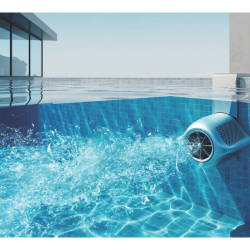Types of Swimming Pool Covers Explained
Although swimming pool covers are often easily overlooked, having a swimming pool cover is crucial if you want to keep your maintenance as straightforward as possible.
There are a few main types of pool covers, each offering different levels of safety, heat retention and protection from debris.
To help you decide which cover is best for your pool, we’ve put together a guide that explores the different types you can find and their pros and cons.
Contents
- The Benefits of Using a Pool Cover
- Solar Pool Cover
- Winter Pool Cover
- Indoor Foam Pool Cover
- Slatted Automatic Pool Cover
- Safety Pool Cover
- Which Pool Cover is Best?
What are the Benefits of Using a Pool Cover?
Before exploring the different types of pool cover, it is important to understand why a pool cover is necessary in the first place.
Pool covers keep your pool clean when it’s not in use by preventing debris from falling into the water. By keeping your pool covered, you won’t have to waste time fishing things out of the water when you want to go back in for a swim.
On top of this, when organic debris falls into the water, the chlorine will prioritise its time to help break the various floating objects; this will use up the chlorine, decreasing it much more quickly. It’s best to either fish out the objects or prevent them from falling into the pool in the first place.
As well as this, pool covers can offer a range of other benefits, such as:
- Decreased water loss
- Improved heat retention
- Less strain on chemicals
- Less chance of the filter becoming blocked
- Increased safety for in-ground pools
At 1st Direct Pools, we supply made-to-measure pool covers in a wide variety of ranges. For more information, take a look at our pool cover calculator.
Solar Pool Cover
Perfect for retaining heat during the summer
A solar cover is relatively inexpensive and provides your basic level of pool covering, including heat retention and protection from debris.
If you don’t have a cover yet, you should consider getting one of these. However, note that this cover doesn’t provide any safety protection and can’t support the weight of a child or animal.
Solar covers are also known as bubble covers due to their bubble-wrap design. The cover’s thin material allows the sun’s rays to pass through while the air bubbles help to keep the heat in the water.
The bubble cover material comes in a variety of thicknesses. The thicker the material, the better the heat retention and, therefore, the lower the heating costs.
What are the Advantages of Using a Solar Pool Cover
- Heat retention – These covers are designed to let heat in and retain it in the water.
- Keep out debris – Any light debris can be kept out of the pool with a solar cover.
- Inexpensive – Compared to other options, solar covers are relatively inexpensive.
What are the Disadvantages of a Solar Pool Cover
- No safety element – Does not provide protection if children or animals stand on top.
- Lifespan – While solar covers are good for a few years, they have a shorter lifespan than other alternatives.
Winter Pool Cover
Perfect for closing the pool during winter
A winter pool cover is a mesh layer secured around the perimeter, completely encapsulating the pool. These are designed to keep debris out during the winter period and also protect from the harsh weather. If you have an outdoor pool, you will need a winter pool cover for the colder months.
Because winter covers are made out of mesh, water and snow can be filtered through into the pool while keeping debris on the top. This feature prevents the cover from being weighed down by excess water while keeping the pool clear from debris.
It is worth stating that these are not safety covers and are not designed to support the weight of children or animals. When closing your pool for the winter, it can be beneficial to add a fence around the pool to prevent animals from attempting to cross if choosing a winter cover.
What are the Advantages of using a Winter Pool Cover?
- Protection – Fully protects the pool from the debris and harsh weather conditions.
- Chemical retention – Winter pool covers help protect chemicals from evaporation.
- Durable – As long as they are carefully stored, winter pool covers can be very long-lasting.
What are the Disadvantages of using a Winter Pool Cover?
- Safety – While stronger than solar covers, these are still not safety covers and don’t offer protection.
Indoor Foam Pool Cover
Perfect for protecting your indoor pool
Foam pool covers are specifically designed for the unique environment of indoor pools. Here, the ambient temperature tends to be higher, increasing evaporation when covers aren’t utilised.
Foam covers are primarily designed to retain the heat of indoor pools. Similarly, the thicker the foam, the better its heat retention. Again, these are not safety covers.
Foam covers are somewhat similar to solar covers. Both use a reel or roller and are fixed to one end of the pool, and usually require manual operation. A foam cover is always recommended for indoor pools, as they are designed to withstand warmer temperatures.
What are the Advantages of an Indoor Foam Pool Cover?
- Heat retention – These covers are designed specifically to maintain your pool’s heat.
- Chemical protection – Foam covers minimise evaporation, keeping your chemicals in the water.
- Durability – These covers are designed to withstand the impact of increased temperatures.
What are the Disadvantages of an Indoor Foam Pool Cover
- Indoor only – Foam covers are often not the best choice for outdoor use compared to solar covers.
- Safety – These covers are not designed to support the weight of children or animals.
Slatted Automatic Pool Cover
Perfect for fast, efficient and safe cover
As the name suggests, a slatted pool cover consists of multiple slats that run along the width of the pool, providing a more robust cover compared to ‘over the top’ and roller options.
A slatted pool cover will be fitted to your swimming pool and can be operated automatically. They can be used for both indoors or outdoors.
If used in the correct way, a slatted pool cover provides some safety element and can take the weight of small children and animals, as long as they are secured correctly. However, they are not considered full safety covers.
What are the Advantages of a Slatted Automatic Pool Cover?
- Debris – Slatted covers offer complete protection from debris for your pool.
- Automatic – Slatted covers can be operated automatically, making covering your pool much easier.
- Style – Slatted covers can offer a luxury finish to your pool when it’s closed.
What are the Disadvantages of a Slatted Automatic Pool Cover?
- Expense – Due to fitting and future maintenance, slatted pool covers are among the more expensive options available.
Safety Pool Cover
Perfect for protecting your pool, family and pets
Safety pool covers are considered by many as the ultimate pool cover option. These covers offer all of the benefits of other covers with the added advantage of being able to support the weight of children or animals, which is hugely important for families, especially if you want to avoid any accidents.
Safety covers are often attached to tracks that run alongside the pool. These tracks not only support any weight on the cover but ensure the pool is completely sealed, helping to protect against debris and evaporation.
Safety covers can come in manual or automatic versions and come in various mounts:
- Below ground pit mounted
- Top track
- Flush track
It is worth noting that the maximum size a manual safety cover can be made to is 9.3 x 4 meters.
What are the Advantages of a Safety Pool Cover?
- Protection – As the name suggests, safety covers offer unparalleled protection for your pool, children and pets.
- Debris – Safety covers completely protect the pool from any debris.
- Evaporation – Safety covers protect the water from evaporation, protecting both heat and chemicals.
What are the Disadvantages of a Safety Pool Cover?
- Winterisation – While they offer some protection during winter, they are not as strong in this regard as winter pool covers.
- Water collection – After rainfall, water can accumulate on your safety cover, which can damage it if not removed.
- Expense – Safety covers are often more expensive than most other alternatives.
What Type of Swimming Pool Cover is the Best?
As you can see, there are various pool covers available, each providing different advantages.
Of course, what the best option is for you will depend on a range of factors, such as:
- What pool you have.
- How you use your pool.
- Whether you have family or pets/animals.
Our table below goes through each type of cover again, so you can see what you get with each option.
| Pool Cover | Advantage | Heat Retention | Safety | Cost |
| Solar Cover | Heat Retention | Excellent | No | Inexpensive |
| Winter Cover | Pool protection | Good | No | Average |
| Foam Cover | Indoor Pools | Excellent | No | Average |
| Slatted Cover | Luxury Protection | Good | Moderate | Expensive |
| Safety Cover | Safety & protection | Good | Excellent | Expensive |
If you have any questions or need further assistance with choosing the right pool cover for you, please contact us. You can get in touch with our experts directly or use our online contact form. We will make sure to get back to you as soon as we can.








